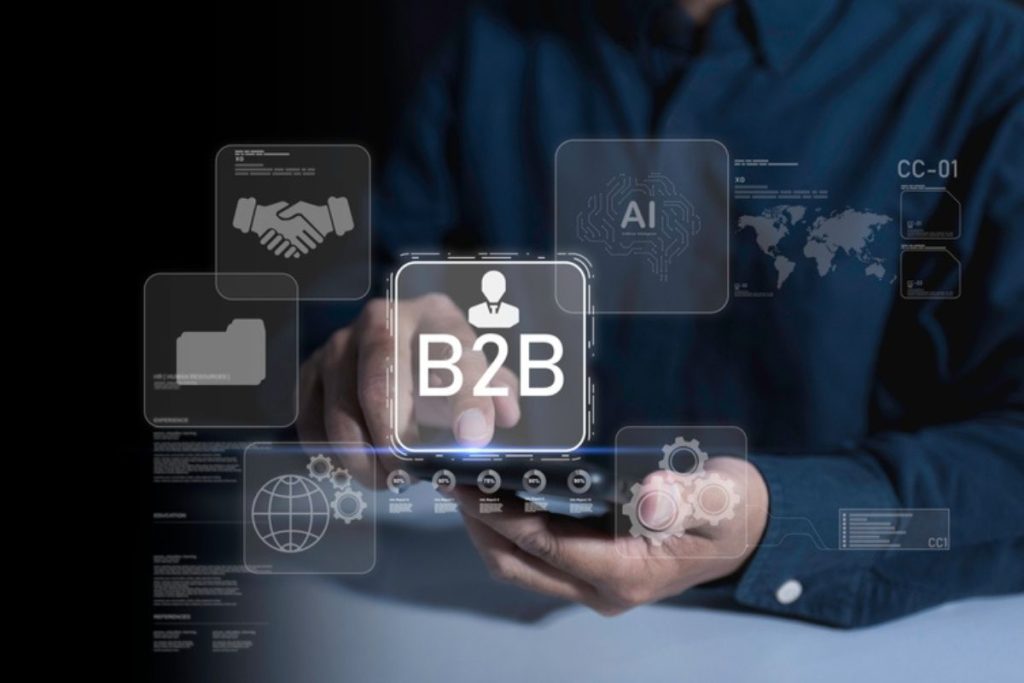The Future of B2B: Harnessing AI Automation to Drive Success
The landscape of B2B is shifting as firms increasingly turn to AI automation for calculated benefit. This change promises to enhance effectiveness and customer involvement through advanced innovations. Nonetheless, the integration of these devices is not without its challenges. Recognizing exactly how organizations can navigate this progressing terrain will certainly be vital for future success. What variables will figure out the effectiveness of AI in this industry? The answers might redefine standard organization versions.
Comprehending AI Automation in B2B
As organizations significantly look for effectiveness, recognizing AI automation in B2B ends up being vital. Growth Systems For B2B. AI automation refers to making use of artificial intelligence innovations to boost and enhance business processes. In the B2B sector, this includes the integration of AI devices to manage jobs such as data analysis, consumer interactions, and supply chain procedures. By leveraging artificial intelligence and natural language handling, firms can boost accuracy, reduce human error, and speed up decision-making. AI automation promotes the handling of big volumes of data, allowing companies to extract valuable insights and maximize their procedures. As organizations navigate this technological landscape, an extensive grip of AI automation's capabilities will equip them to remain responsive and competitive to market demands
Secret Advantages of AI Automation for Organizations
While several businesses face boosting functional demands, AI automation provides countless advantages that can noticeably enhance their performance. One substantial benefit is performance; AI systems can do repetitive jobs faster and with better precision than human beings, therefore lowering mistakes and freeing up staff members for more calculated efforts. In addition, AI automation makes it possible for data-driven decision-making by evaluating huge datasets rapidly, offering insights that educate company approaches. Cost reduction is one more key benefit, as automation minimizes labor expenses and enhances source allotment. AI can enhance scalability, enabling services to adjust to market modifications swiftly. Eventually, the assimilation of AI automation cultivates development, making it possible for firms to continue to be affordable in a rapidly advancing landscape.
Transforming Customer Experiences With AI
AI is improving client experiences by improving and enabling tailored communications engagement. Via the execution of anticipating analytics, organizations can prepare for customer requirements and preferences, leading to a lot more tailored services. Furthermore, improving support processes with AI technology enhances performance and fulfillment, eventually changing the total customer trip.
Individualized Communications and Engagement

Predictive Analytics Execution
As companies increasingly seek to improve consumer experiences, carrying out anticipating analytics has arised as a crucial strategy in the B2B sector. By leveraging data-driven understandings, companies can prepare for client needs and choices, enabling them to tailor their offerings much more properly. Predictive analytics uses historical information and innovative formulas to anticipate future habits, enabling businesses to recognize prospective obstacles and opportunities. This proactive method not only improves consumer fulfillment yet additionally promotes loyalty by providing prompt and pertinent remedies. In addition, predictive analytics assists in resource allowance, guaranteeing that advertising and marketing efforts are focused on high-value prospects. Eventually, the combination of anticipating analytics outfits B2B firms with the tools necessary to change customer communications and drive long-term success in a significantly competitive landscape.
Improving Support Procedures
Enhancing customer experiences in the B2B market expands beyond predictive analytics; enhancing assistance processes plays an essential function. By incorporating AI-driven solutions, services can automate regular inquiries and enhance reaction times, causing enhanced customer complete satisfaction. Chatbots and online aides provide 24/7 support, dealing with customer requires without delay and reducing the concern on human representatives. This automation permits groups to focus on complex issues, promoting even more purposeful communications. AI tools can analyze support data to determine trends and areas for renovation, making sure continual enhancement of solution top quality. As organizations take on these technologies, they place themselves as customer-centric and responsive, eventually driving commitment and company development in an increasingly competitive landscape
Enhancing Workflow and Processes
Improving operations and procedures in B2B environments is necessary for improving overall effectiveness. By maximizing operations performance and automating regular jobs, companies can reduce manual errors and maximize important sources. This shift not only improves productivity but also enables groups to concentrate on strategic initiatives that drive development.
Maximizing Operations Performance
Optimizing workflow performance is essential for companies seeking to decrease operational prices and boost productivity. By evaluating existing processes, companies can recognize traffic jams and redundancies that impede performance. Executing streamlined procedures boosts interaction and cooperation amongst groups, making certain that jobs are finished a lot more promptly. Utilizing data-driven understandings enables firms to make informed decisions that improve procedures better. Additionally, adopting incorporated innovations can help with smooth info flow, lessening the danger of hold-ups and errors. As organizations accept these changes, they not just foster an extra nimble job atmosphere yet likewise place themselves to respond promptly to market demands. Inevitably, concentrating on process efficiency enables organizations to assign sources efficiently, driving lasting success in a progressively affordable landscape.
Automating Routine Jobs
Many organizations are increasingly turning to automation to handle routine jobs, recognizing its prospective to greatly improve functional efficiency. By deploying AI-driven options, firms can improve repeated tasks such as data entry, invoice handling, and customer inquiries. This shift not just lowers human error but likewise maximizes beneficial employee time, allowing personnel to concentrate on value-added tasks and calculated campaigns. Additionally, automation can enhance i was reading this action times and solution uniformity, leading to improved client complete satisfaction. As services browse an affordable landscape, leveraging automation for regular jobs ends up being important for maximizing workflows and keeping agility. Eventually, this approach promotes technology and drives growth, placing companies for long-term success in the advancing B2B atmosphere.
Enhancing Decision-Making Via Data Insights
As organizations navigate a significantly complex landscape, leveraging information insights ends up being crucial for informed decision-making. AI Automation For B2B. By making use of ai-driven tools and advanced analytics, organizations can transform raw data into workable knowledge. This allows them to identify trends, projection market modifications, and enhance strategies based on real-time information. Enhanced decision-making procedures count on data visualization techniques, permitting stakeholders to quickly translate intricate datasets and make swift, evidence-based choices. Furthermore, understandings originated from customer habits and market characteristics encourage firms to customize their offerings, improving client contentment and driving development. Ultimately, using data insights not only improves decision-making efficacy yet likewise settings services to stay affordable in a quickly progressing market
Conquering Challenges in AI Implementation
Although AI execution holds the promise of substantial operational renovations, companies commonly deal with a myriad of challenges that can prevent progression. Secret challenges consist of data high quality concerns, as numerous enterprises struggle with irregular or insufficient datasets required for efficient AI training. Additionally, resistance to change within the labor force can restrain the fostering of AI technologies, as staff members might fear work displacement or do not have the required abilities. Spending plan constraints also present a difficulty, restricting financial investment in the required infrastructure and skill. Furthermore, integrating AI systems with existing procedures can be intricate, requiring considerable time and resources. Overcoming these challenges demands a strategic approach that includes complete training, modification management, and a commitment to continual renovation in AI efforts
Future Fads: The Following Frontier in B2B Automation
While the landscape of B2B automation remains to progress, arising fads are poised to redefine how companies run. The integration of innovative expert system will assist in a lot more individualized consumer experiences, enabling services to customize services exactly to client requirements. The rise of anticipating analytics will certainly make it possible for companies to anticipate market shifts and enhance decision-making procedures. Automation of regular tasks through robot procedure automation (RPA) will certainly enhance effectiveness, lowering functional prices significantly. Furthermore, the fostering of blockchain modern technology guarantees boosted transparency and security in purchases. As these advancements gain traction, business will significantly leverage AI-driven insights to promote cooperation, simplify supply chains, and boost total efficiency, marking a transformative shift in the B2B landscape.
Regularly Asked Questions
What Kinds of Organizations Can Benefit Most From AI Automation?

How Can Local Business Carry Out AI Automation Successfully?
Local business can carry out AI automation effectively by determining recurring jobs, picking user-friendly tools, making sure sufficient training for staff members, and gradually integrating services to maximize workflows while keeping an eye on performance and changing methods based on feedback.
What Prevail Misconceptions Concerning AI in B2B?
Typical misconceptions about AI in B2B include the idea that it is only for big enterprises, that it guarantees instantaneous results, and that it can fully change human decision-making as opposed to increasing it.
Exactly How Does AI Automation Impact Staff Member Roles and Work Safety?
AI automation improves staff member duties by streamlining repetitive tasks, cultivating performance and innovation. While some fear work loss, it usually develops possibilities for upskilling and brand-new positions, inevitably boosting work safety via added value and performance.
What Abilities Are Required to Handle AI Automation Projects?
To manage AI automation projects, people need strong analytical skills, task administration expertise, efficiency in information evaluation, understanding of maker understanding ideas, efficient interaction abilities, and versatility to swiftly changing technical settings. These skills assure successful application.
As companies progressively look for effectiveness, understanding AI automation in B2B becomes necessary. AI automation assists in the handling of big quantities of information, enabling companies to draw out valuable understandings and optimize their procedures. While many businesses grapple with increasing operational needs, AI automation presents many benefits that can substantially boost their efficiency. Automation of regular tasks through robot procedure automation (RPA) will certainly improve effectiveness, decreasing operational prices substantially - AI Automation For B2B. Production, logistics, and customer service companies can profit most from AI automation